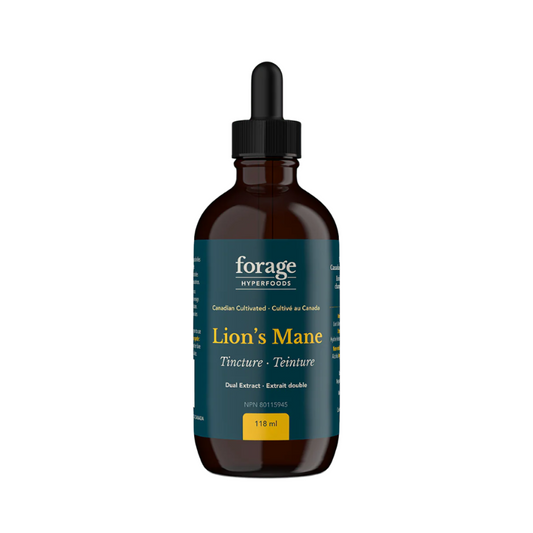
The History and Benefits of Lion's Mane
Share
Lion’s Mane mushroom is arguably one of the most interesting functional mushrooms in existence. It is unique in appearance, but it also has fascinating nutritional properties and an abundance of medicinal potential.
What is Lion’s Mane mushroom?
Scientifically known as Hericium erinaceus, Lion’s Mane is a medicinal mushroom that belongs to the tooth fungus group, a genus known for its tooth- or spine-like fruiting bodies.
Lion’s Mane grows on hardwood trees, paying special favour to the American beech, in temperate forests throughout the Northern Hemisphere. As its name suggests, Lion’s Mane features a stringy, white fruiting body that resembles the mane of a lion.
A brief history of Lion’s Mane
Lion’s Mane had played a role in Asian culture and Traditional Chinese Medicine (TCM) long before it was introduced to the west. According to TCM, this powerful mushroom supports all five internal organs—liver, spleen, lung, heart, and kidney. The mushroom is also hailed in TCM to combat the deficiency of Qi, or “life force.”
Buddhist monks were said to have made tea using Lion’s Mane mushroom powder to enhance brain function and heighten their focus during meditation. This is not surprising when you learn of the many brain-boosting benefits it offers, which we’ll get to shortly.
While Lion’s Mane was once only foraged from the wild, the Chinese began cultivating it in 1988. It’s now widely grown indoors on a substrate, such as hardwood sawdust, as demand for this medicinal mushroom has exploded.
The health benefits of Lion’s Mane
Lion’s Mane offers a range of impactful, science-backed healing properties that are benefitting people across the globe:
- Enhances cognitive performance: Often referred to as “the smart mushroom," Lion's Mane’s top claim to fame is its ability to improve brain function, particularly memory, focus, and clarity. This benefit is thought to be due to the mushroom’s potent antioxidant and anti-inflammatory properties, which increase blood flow to the brain.[*] Research also suggests that Lion’s Mane may help protect against memory problems caused by the buildup of amyloid-beta—a substance that forms the brain plaques associated with Alzheimer’s disease.[*]
- Supports nerve health and recovery: Arguably, a unique benefit of Lion's Mane is that it promotes the creation of a compound called nerve growth factor (NGF).[*] NGF is a protein that stimulates the production of new nerve cells and strengthens existing ones. Lion’s Mane may encourage damaged nerves to grow and repair more quickly.[*]These findings are particularly promising for neurodegenerative diseases like Alzheimer’s disease, Parkinson’s disease, and stroke, as Lion’s Mane may slow or reverse cell degeneration in the brain.[*]
- Helps alleviate anxiety and depression: In animal studies, Lion’s Mane has been shown to reduce symptoms of anxiety and depression.[*][*]
- May protect against cancer: Preliminary research suggests that Lion’s Mane may offer protection against cancer.[*]
- Boosts the immune system: Research has shown that Lion’s Mane may stimulate activity of the intestinal immune system, which is the body’s defense against pathogens that enter the body through the mouth and nose.[*]
The bottom line
With roots in Traditional Chinese Medicine, Lion's Mane has become a popular functional mushroom in Western culture. With far-reaching health benefits that may offer protection from some of the world’s most destructive diseases, adding a high-quality Lion’s Mane supplement to your daily routine is certainly worth considering.
At Forage Hyperfoods, we offer a dual-extracted, 100% Canadian cultivated Lion’s Mane tincture (original or alcohol-free), making it easier than ever to get a daily dose of this powerful medicinal mushroom.


